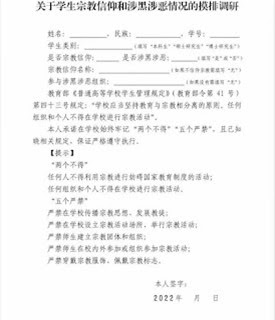The form quotes the Chinese Ministry of Education’s “Provisions on the Administration of Students in Regular Institutions of Higher Education” (Ministry of Education Order No. 41) No. 43 states that: “Schools should adhere to the principle of separation of education and religion. No organization or individual may conduct religious activities in schools.”
The form requires the applicant to promise to be mindful of the following in school: “two must nots” and “five prohibitions,” students are to ensure compliance.
The two “must nots” refer to: “No one may use religion to carry out activities that obstruct the national education system; no organization or individual may conduct religious activities in schools.”
The five prohibitions are: “It is strictly forbidden to spread religious thought and proselytize in schools; it is strictly forbidden to set up venues for religious activities and hold religious activities in schools; it is strictly forbidden for teachers and students to establish religious groups and organizations; it is strictly forbidden for
teachers and students to participate in or organize religious activities inside
or outside school; it is strictly forbidden to wear religious clothing and wear
religious symbols.”
At the bottom of the form, it required the parties’ signatures.
The survey form did not provide further explanations for “spreading religious thought in schools,” “proselytizing,” or “wearing religious symbols.” These provisions clearly limit religious freedom for student believers outside of class time. The “prohibited” content of the survey form also contradicts regulations of religious beliefs according to the Chinese constitution.
According to previous surveys and reports on the religious beliefs of college students, the proportion of Chinese students in higher education who believe in Christianity is much higher than that of the general society. College students were found to have strong Christian beliefs, and the house gathering venues scattered on and around college campuses have a strong appeal to students. The form check does not indicate which ethnic group or which religion is specifically targeted.
~Gao Zhensai, Special Correspondent of ChinaAid
